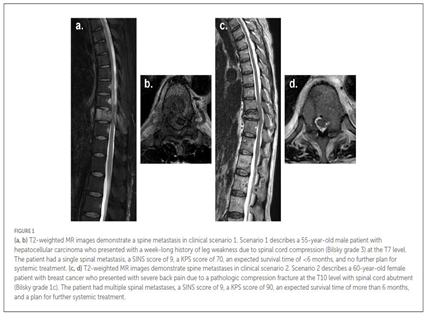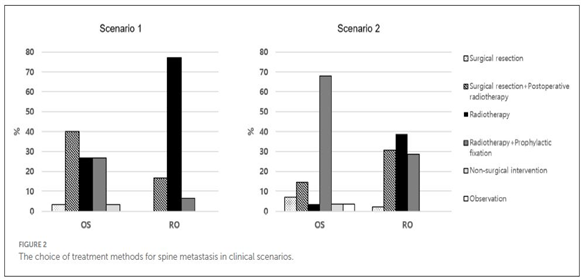글로벌 연구동향
방사선종양학
- 2024년 04월호
[Front Neurol .] Different decision-making in spine metastasis management among radiation oncologists and orthopedic surgeons: a Korean online survey study연세의대, 성균관의대 / 변화경, 금웅섭*, 안용찬 *
- 출처
- Front Neurol .
- 등재일
- 2024 Jan 11:14:1317858.
- 저널이슈번호
- 내용
Abstract
Purpose: To understand the current practice of radiation oncologists (ROs) and orthopedic surgeons (OSs) regarding spine metastasis.Methods: In 2022, an internet-based survey was conducted for ROs and OSs who treat spinal metastasis in Korea. Respondents were asked to choose the treatment option for two clinical scenarios. Scenario 1 involved a case displaying symptoms of leg weakness due to spinal cord compression and Scenario 2 involved a case with back pain due to pathologic compression fracture. The survey also included a question that required respondents to rank the importance of 11 clinical factors that affect treatment decisions.
Results: Forty-nine ROs and 30 OSs responded to the survey. There were significant differences in treatment choices between two groups for both scenarios (P = 0.001). In Scenario 1, more OSs chose surgical resection than ROs (43.3% vs. 16.7%), while more ROs chose radiotherapy than OSs (83.3% vs. 53.3%). In Scenario 2, a similar proportion of OSs and ROs chose radiotherapy (OSs, 71.4% vs. ROs, 67.3%), while more OSs opted for prophylactic fixation after radiotherapy than ROs (95.0% vs. 42.4%). The top three factors influencing treatment decisions were general performance status, life expectancy, and spinal instability for both ROs and OSs. In both Scenarios 1 and 2, the treatment decisions of ROs changed significantly when clinical conditions related to these top three factors were altered.
Conclusion: Although ROs and OSs share the same factors influencing treatment decisions for spinal metastases, notable differences exist in their actual treatment preferences, with ROs preferring radiotherapy and OSs opting for surgical resection. Multidisciplinary discussions may be necessary to reduce the gap in decision-making.


Affiliations
Hwa Kyung Byun 1, Woong Sub Koom 2, Se-Jun Park 3, Sang-Il Kim 4, Jin Ho Kim 5, Young-Hoon Kim 4, Bong-Soon Chang 6, Yong Chan Ahn 7
1Department of Radiation Oncology, Yongin Severance Hospital, Yonsei University College of Medicine, Yongin-si, Republic of Korea.
2Department of Radiation Oncology, Yonsei Cancer Center, Yonsei University College of Medicine, Seoul, Republic of Korea.
3Department of Orthopedic Surgery, Samsung Medical Center, Sungkyunkwan University School of Medicine, Seoul, Republic of Korea.
4Department of Orthopedic Surgery, Seoul St. Mary's Hospital, College of Medicine, The Catholic University of Korea, Seoul, Republic of Korea.
5Department of Radiation Oncology, Seoul National University Hospital, Seoul National University College of Medicine, Seoul, Republic of Korea.
6Department of Orthopedic Surgery, Seoul National University Hospital, Seoul National University College of Medicine, Seoul, Republic of Korea.
7Department of Radiation Oncology, Samsung Medical Center, Sungkyunkwan University School of Medicine, Seoul, Republic of Korea.
- 키워드
- multidisciplinary discussion; pattern of care; radiotherapy; spine metastasis; surgical resection; survey.
- 덧글달기
- 이전글 [Front Oncol .] Prospective study investigating hypofractionated proton beam therapy in patients with inoperable early stage non-small cell lung cancer
- 다음글 [Medicina (Kaunas) .] A Potential Radiomics-Clinical Model for Predicting Failure of Lymph Node Control after Definite Radiotherapy in Locally Advanced Head and Neck Cancer







